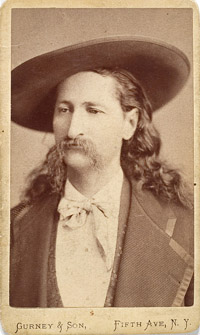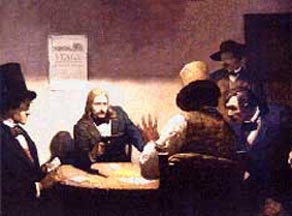|
It is commonly known that Bill was a Constable, Union Scout, Showman, noted Lawman, Gunfighter and Gambler.
No doubt Wild Bill engaged in gambling at a tender age as that was what many men did for entertainment. Plus, it was very common for soldiers to pass the time when not in battle or marching to a given location to gamble among themselves.
Always interested, especially, in an engaging game of cards Wild Bill surmised that a little money could be found if he were to perfect his skills just a bit, as he also honed his ability to size up a mark.As a professional gambler -- "cardsharp" is a negative term and we have no solid proof -- Wild Bill operated on the very edge of propriety, doubtless taking a sucker when the pot was worth the effort. There were many competitors in this shifty and nefarious trade, and the bulk of them operated on the wrong side of any form of law. Such a man was one Dave Tutt, a cardsharp of the slickest description. Wild Bill and Tutt played cards on the night of July 20, 1865 with Tutt getting the better of Bill. First it was Bill's stake then his watch, pin and ring. Bill asked Tutt not to wear his watch in public but Tutt responded it would give him as much pleasure to wear the watch in public as it did winning it. Bill replied with an oath, "if you do, I'll shoot you, and I warn you not to come across the square with it on.'' The two men parted and retired to their rooms -- to put fresh caps on their revolvers!
 The next morning Tutt put on his watch, -- and his revolver, too, and went down on the square. Going along the west side he entered the livery stable on the northwest corner and sat in the door where he could command a view of all four sides of the square, and especially of the Lyon House and South street. Very soon afterward Hickok came out of the hotel and down on the square, at the corner of South street. He stood on the west side of the street, and stopping one or two passers-by inquired if they had seen "Dave Tutt down town this morning?" On being told that Tutt was on the square, Bill said, "Well, it's all right if he ain't got my watch on, but if he has there'll be merry hell, you bet your life!" Tutt's younger brother came up, and to him Bill said, "You had better go and tell Dave to take off that watch;" and when young Tutt said he thought his brother had a right to wear what he pleased if it belonged to him, Bill answered, "He shan't wear that watch anyhow." Just then Tutt came out of the livery stable and walked south along the square. Bill saw him and exclaimed, "There he comes now." The little group about Bill scattered, and he took a few steps forward and drew his revolver, a Colt's dragoon cap and ball.
Just as Tutt reached the corner of the court-house and Campbell street, Bill called out, "Dave, don't you come across here with that watch." Tutt, as some say, drew his pistol, and almost instantly Bill fired, using one arm as a rest for his revolver. Tutt fell, shot nearly through the heart, and died very soon. Some deposed that Tutt's revolver was out of its scabbard when the body was first examined, and that Tutt had fired first. One chamber of the revolver was empty, and there were those who swore that they heard two pistol shots.
The Alamo Saloon in Abilene, Kansas was the most posh place in town, with etched glass swinging doors, shining brass, polished mahogany, ferns, waiters in actual uniforms with gold braiding on them, and every gambling device a person could imagine. It was Wild Bill's favorite. The second most popular spot was the Bull's Head Saloon, which was expensive beyond belief. It did an excellent profitable business for its two Texas gambler owners, Phil Coe and Ben Thompson. In these places Wild Bill plied his trade but not with much success.
Unemployed after the accidental shooting of his own Deputy, Mike Williams, Wild Bill decided that he liked being a gambler just as much as a lawman. He packed up his reputation and a couple decks of "special" cards, and headed off toward Deadwood, Dakota Territory. There was a gold rush going on and likely miners ready to relinquish their money.
It is true that Bill traveled by stagecoach to Deadwood with a gal named Jane, Calamity Jane that is, but they were not traveling together and there is no evidence to imply they were ever lovers.
Though Bill aspired to be a "professional gambler," what he had really accomplished was to become a profound drunk, for he turned out to be unremarkable as a cardsharp. In fact, it has been written that Wild Bill, on more than one occasion, turned to his pair of ivory handled Colts to claim a pot.
 In the downward spiral which overtook him then, he tried vainly to resume a career as a gambler, but no longer possessing the necessary skills and just barely was able to keep himself properly suited and situated so as to hold on to the reputation and the illusion, he was repeatedly arrested for vagrancy. Seldom sober, he was 39 and still in a free fall.
At Nuttall and Mann's #10 Saloon, Wild Bill was playing a game of low stakes poker at his usual table in the corner near the door. Jack McCall, who was drinking heavily at the bar, saw him there and his face turned a deep crimson, but said nothing. McCall slowly walked around to the corner of the saloon where Hickok was playing his game. Under his coat, McCall's hand gripped his pistol. He came up slowly behind Hickok, attempting to create the impression that he was a casual observer of the game, and in this attempt watched several hands being played.
Harry Young and Anson Tipple were both tending bar at the #10 that day. At Wild Bill's table were follow players Charles Rich, Riverboat Captain William Massie, and Co-Owner of the #10 Carl Mann.
Mann had just busted Wild Bill with four 7's with a King kicker verses Bill's fullhouse of King's over. This information comes from barkeep Harry Young's court testimony. Young further stated he was in the process of delivering more chips to Wild Bill when McCall drew his revolver and shot Wild Bill Hickok in the back of the head, killing him instantly.
At that very moment we were all lead to believe that the "Dead Man's Hand" was born but that is far from the truth.
The "Dead Man's Hand" and I quote famed author Joseph Rosa, "It is part of Wild Bill's legend that the hand of poker he held when he was shot from behind by Jack McCall in Nuttall & Mann's No. 10 Saloon in Deadwood on August 2, 1876, was forever afterward known as the " Dead Man's Hand." Curiously, none of the contemporary reports mention the cards Hickok held, and it was not until the 1920's that Ellis T. " Doc" Peirce told writer Frank J. Wilstach that Bill's hand read 'aces and eights' - two pair." Since that fateful poker game, according to Peirce, " aces and eights have been known as 'the dead man's hand in the Western country."
The best person in a position to see Wild Bill's hand that fateful day was bartender Harry Young and Young stated that Bill's hand was "King's Full". Now keep in mind that that was the hand that broke Bill and which caused Young to approach the table with more chips for Bill. No doubt while this was taking place a new hand was being dealt. But no one has a clue what those cards were since they went flying through the air as Bill lounged forward as the bullet struck the back of his head.
James Butler Hickok was buried in the cemetery outside Deadwood. Calamity Jane insisted that a proper grave be built in honor of the man she still loved, and an enclosure 10'x10' was built around his burial plot. On top of that little encircling stone wall was placed a 3' fence which had fancy cast iron filigree on top, and a small American flag was stuck into the ground in front of the tombstone in honor of his service in the War.
|